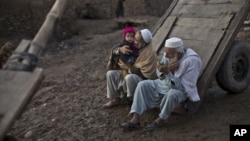The Afghan government revealed Monday that more than one million refugees have “voluntarily” returned home from Pakistan and Iran in 2016, representing the highest number of returnees in 14 years.
Afghan Refugees and Repatriation Minister Sayed Hussain Alimi Balkhi told the national parliament the returnees from the neighboring countries included both registered and undocumented families.
Additionally, he said, a record 551,000 Afghans have fled their homes this year due to fighting and insecurity, raising the overall number of internally displaced persons, or IDPs, in Afghanistan to 1.3 million.
"Over one and a half million people are on the move this year. It is likely that the coming year will see similar numbers of people," warned Tadamichi Yamamoto, the head of the U.N. Assistance Mission in Afghanistan or UNAMA.
He made the remarks while briefing the U.N. Security Council in New York.
The humanitarian situation has become "ever more fragile" in the wake of rapidly increasing numbers of IDPs, exacerbated by the surge of more than 600,000 returning refugees and undocumented Afghans from Pakistan, according to a written report UNAMA submitted to the council.
It noted that returnees from Pakistan continue to cite increased policing and uncertainty over their status in Pakistan, including a fear of eviction, as the main reasons for leaving.
"Many of the newly displaced and returnee Afghans moving within the country are vulnerable and prone to secondary or repeated displacement because of security concerns and the limited ability of cities to absorb the influx," according to the report.
It went on to note that humanitarian access constraints continue to be recorded and are associated primarily with insecurity and conflict-related road closures, particularly in the eastern and southern regions of Afghanistan.
But Danielle Moylan, spokesperson for the U.N. Office for the Coordination of Humanitarian Affairs (OCHA) Afghanistan, said only 10 percent of the estimated 400,000 Afghans who returned from Iran this year need humanitarian assistance.
"We consider many of the numbers from Iran to be circular,” she told VOA. “That means there are a significant number of cases where one person that is moving back and forth across the border could be counted many times."




